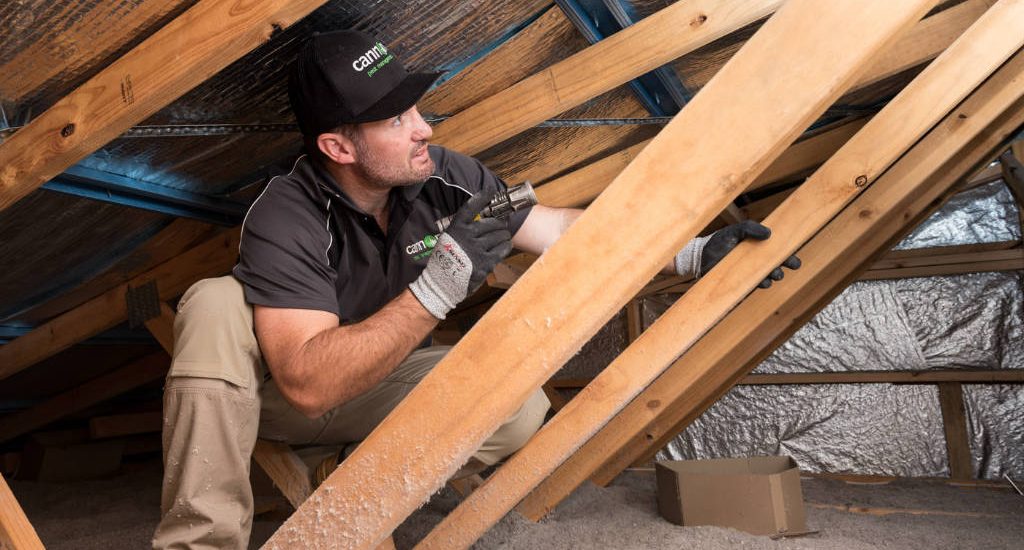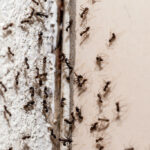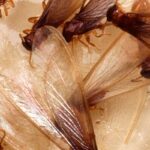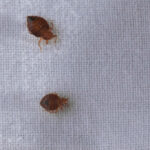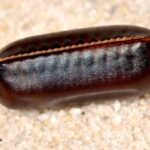So it’s 3 am, and you find yourself sitting bolt upright in bed thinking: “I swear I just heard something on the roof!” You’re probably not crazy, because hearing noises on the roof at night is a very common problem all over the world but particularly right here in Australia.
First things first: why on earth do those noises in roof spaces occur mainly at night? There’s a pretty simple explanation.
To start with, you’re quite often simply not at home during the day to hear them. Secondly, your house goes pretty quiet at night, which alerts us to the presence of any critters. And thirdly, many of the pests that creep around in our roofs and wall spaces are nocturnal, meaning that night is when they ramp up their activity.
So no matter what scratching noise in roof or wall spaces you’re hearing, trust those ears of yours – because you probably really are hearing the busy work of our creepy, furry or feathery friends.
We’re talking about:
1. Birds on roofs
Birds like to call our houses ‘home’, and they find particularly comfy refuge in our roof spaces. But while we may have nothing against our feathered friends, those droppings spread disease. They tend to be most active at dawn or dusk so check around your eaves for birds entering and leaving a nest at these times.
2. Possums on roofs
They may be one of Australia’s beloved native marsupials and pretty cute on top, but possums can be trouble once they’ve moved into your place and are keeping you awake at night.
Have those noises in roof spaces become loud screeches, or perhaps even grunts, growls and hisses? Can you smell something unsavoury? Are your dogs irritated? Is your veggie patch looking nibbled on? You almost certainly have a possum, particularly if you hear that familiar heavy pattering of feet as well. Please don’t attempt to remove possums yourself. For your safety and that of the animal call a pest controller for possum removal.
3. Rodents in roofs
Lacking in that possum-like Australian charm are the familiar rodents including rats and mice. And no one has the time of day for these unwanted pests, especially if they’re the culprits of the scratching noise in roof spaces at your home or business.
Just like with the possum, tune in your ears at night – because that’s when rats and mice are the most active. You’ll hear the light pitter-patter of tiny feet, but perhaps also gnawing sounds. Rats and mice will gnaw at almost anything to keep their teeth worn down and sharp, or enlarge openings and holes for easier access.
4. Something else
You know what? Those noises in roof spaces could be something even more surprising … like a nest of wasps. Particularly if you hear tapping and buzzing, it could mean bees or wasps have decided to call your roof home. If you’re lucky the noises could be tree branches rubbing against your home in the wind, so if windy days are when you hear the noises it’s time for some gardening.
Why scratching noises in roof spaces is bad news
If you’re inclined to hear those noises in roof spaces and think ‘It’s no big deal’, you may want to think again.
Leaving pests to their own devices on your roof can…
Cause damage. Many roof-dwelling pests won’t leave your roof spaces as they found them. Wires, wood and plumbing can be gnawed all the way through, disrupting your asset and life and costing you money to repair and replace your important household services. And if you’re really unlucky, a chewed and exposed wire could even burn your house down.
Spread disease. If you let birds live in your roof, they will eventually attract and spread fleas, mites and potentially also disease. The same is true of rodents, who carry all sorts of bacteria, parasites and diseases, while pest droppings can attract serious insect infestations that bring their own brand of trouble.
Smell. We all know that droppings stink, but do you know what else does? Rotting pest corpses.
So if you’ve had enough of hearing those noises in roof and wall cavities at night, the next step is simple: call in the professional pest controllers, who may also catch early signs of termite infestation before it’s really bad news.

